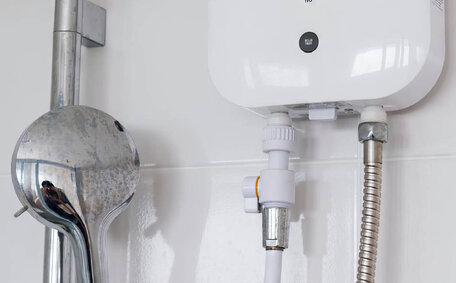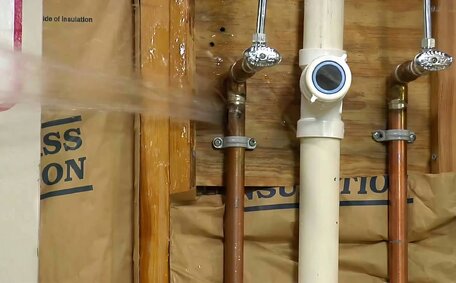Introduction to Home Insurance and Blocked Drains
Blocked drains can cause significant damage to property structures if not addressed promptly. Food waste, grease, hair, and other debris can lead to blocked drains and the subsequent overflow and water damage that may necessitate a home insurance claim.
Before filing a claim for costly blocked drain repairs, reviewing the product disclosure statement is essential to understand your homeowners insurance coverage. Not all insurance companies cover all plumbing damage, so it’s critical to know what aspects of blocked drain damage are included or excluded in your policy.
This article will clarify what standard home insurance policies typically cover—and don’t cover—regarding drain and plumbing issues. Carefully review your policy details, including any exclusions, to prevent unexpected expenses and rejected claims from unforeseen plumbing issues.
Understanding What’s Typically Covered for Drain Issues
Most standard policies cover drains under home contents insurance from unexpected damage caused by sudden issues, with insurance typically covering common problems to protect homeowners. Insurance often covers costs to locate, repair, or replace sections damaged by burst pipes, providing significant financial relief for plumbing issues.
Drain services covered by insurance after a sudden blockage often include:
- Drain inspections with CCTV cameras to identify blockages.
- Hydro jetting to remove obstructions that hardened debris in pipes can create in main drains or sewers.
- Pipe repair, replacement, rerouting, or excavation.
- Cleanups required due to overflows of water, sewage or waste.
Home contents insurance policies vary in their coverage of blocked drain damages, with some covering unforeseen events like sudden water damage to the roof. Insurance often covers urgent repairs, like fixing water heater breakdowns or stopping water leaks, which is vital since blocked drains can exacerbate these issues. It is critical to understand your home insurance coverage for drain-related issues before making any decisions.
Exclusions: When Insurance Might Not Cover Drain Damage
Although urgent repairs to your water system are typically considered, understanding what’s excluded is just as crucial, for there are standard exemptions where home insurance might disclaim claims, thus failing to address costs when it comes to specific plumbing-related appeals:
- Wear and tear, such as gradual deterioration of pipes, fissures from tree roots, and build-up leading to drain degradation, may not be considered a covered loss.
- Prior or existing problems - Damage related to unaddressed issues, such as documented slow-draining, may not be covered.
- Neglecting to perform necessary drain checks or address minor issues before they worsen may be excluded from coverage.
- Natural disasters - Damages solely stemming from extreme weather events, earthquakes, floods, etc., may not be covered under home insurance but could be part of separate flood insurance or disaster relief policies.
However, comprehending the entire breadth of your home insurance protection, including customary exceptions, can lessen worries about denied claims with the guidance of our team.
DIY Plumbing Repairs
DIY repairs may initially seem cost-effective, but plumbing issues caused by inexperienced efforts are typically uninsured, can escalate, and lead to more severe complications. Most home insurance policies do not usually cover damage resulting from DIY repairs or improper installations.
If your DIY plumbing job on your pipes fails or causes additional burst pipes water flooding or leakage, In these scenarios, it’s vital to coordinate with your insurance agent to discuss a potential denial of your insurance claim for reparations of any damage.
Our team of licensed and insured plumbers has the expertise to accurately perform services within your property on the first attempt and provide all necessary compliance certificates. We can also liaise directly with your insurer if insurance claims are required.
Tips for Preventing Blocked Drains
Blocked drains, often resulting from factors like tree roots or household debris, don’t occur suddenly but develop over time. Small bits of food waste, hair, and other debris accumulate over time, which a blocked drain can result from if not addressed. However, homeowners can employ straightforward methods to aid in averting the clogging of your drain.
Install drain screens or strainers over sinks and shower drains, an activity often recommended within your home insurance policy to catch hair and food particles that cause blocked passageways before they go down the pipe. Make sure to easily remove and clean these when needed. Use drain cleaners and enzyme treatments monthly to break down grease and keep water flowing freely.
Be mindful not to pour fats or harsh chemicals down any drains and find out the best practices to avoid buildup. Dispose of food scraps, coffee grounds and other waste in the trash can. Consider installing hair catchers as well if excessive hair shedding is an issue.
While consistent and regular maintenance aids in evading plumbing dilemmas, we strongly suggest you are taking care to check your expert drain inspections biennially, to guarantee covered home insurance stays intact, especially for residence in aged dwellings. Your plumber at Bexley Plumbing can highly recommend steps to take for potential trouble areas within your plumbing system before they escalate into expensive emergencies.
Identifying and Responding to Blocked Drain Signs
Early recognition of blocked drains is essential in preventing significant issues that can compromise your home. There are a few key signs of a slow or clogged drain to watch out for:
- Water draining very slowly or not at all
- Gurgling sounds coming from drains
- Sinks/tubs taking longer than usual to empty
- Unpleasant sewage odours wafting into your living spaces from drains
- Pools of standing water around floor drains
Recognising these signs is essential; it’s important to act swiftly to secure your drains’ clarity and functionality. Begin with a plunger or drain snake to attempt dislodging clogs. Avoid dumping harsh chemical drain cleaners down drains as these can sometimes worsen problems.
For severe or recurrent drain obstructions, enlist the aid of our team at Bexley Plumbing for more information and proficient support. Our licenced technicians have the skills and equipment to thoroughly inspect drains and sewer lines and resolve stubborn clogs. We can also determine if any damaged pipes or root invasion requires repair.
Tackling water leaks and drain issues promptly in the event of significant backups and flooding can mitigate the scope of property detriment and ensure your plumbing complications are within the bounds of the insurance coverage—damage can thus be effectively ameliorated. When it comes to plumbing mishaps, reviewing your policy thoroughly to understand the available coverage and exclusions is crucial. If drain repairs are needed, we’ll work with your house insurance to smoothly handle any potential claims.
Navigating Insurance Claims for Blocked Drain Damage
If a blocked drain or sewage backup has resulted in significant water damage or flooding requiring major repairs, filing an insurance claim should be your next step. But there are important actions to take beforehand:
- Document the damage to water pipes through photos/video as soon as possible once discovered.
- Prevent further damage where possible by turning off your water supply and organising emergency plumbing repairs.
- Report any damages to your insurance provider promptly, as most drains covered home insurance policies have a few hours window to claim.
Clearly relay how and when the incident occurred, while providing any documents that detail your claim on drain blockage repairs and itemised costs. Seek clarification from claims agents on policy limits, exclusions, and preapprovals needed for services based on your coverage.
As a policyholder still faces potential out-of-pocket costs due to deductibles and non-covered expenses even with claim approvals, consulting our team at Bexley Plumbing early when facing significant drain damages can determine the most cost-effective solutions while liaising with your insurer on your behalf if required.
Working With Your Insurance Company and Adjuster
When filing an insurance claim for blocked drain damages, a claims adjuster will likely be assigned to assess your case. As your key contact handling the claim, the adjuster plays an important role in determining coverage details and approval amounts.
To facilitate the process, be prepared to provide the adjuster with documentation like plumbing invoices and photos/videos showing the damage. They may also request access to inspect the affected areas of your home firsthand.
Keep your policy accessible to review the specific coverage and exclusions. Should you harbour any questions about the policy language or need further details about drain/sewer line repairs, don’t waver in seeking elucidation. Share copies of any professional drain assessments detailing the underlying issue, which can help show it was an unpreventable accident eligible for claim approval.
While amicable relations with your adjuster smooth the process, dont hesitate to escalate any unresolved concerns to a supervisor. Our team at Bexley Plumbing can also liaise directly with your insurance company to verify details like repair costs on your behalf.
Staying organised and keeping your adjuster updated on any developments demonstrates youre navigating the claim properly. with a collaborative approach, you can achieve an optimal settlement when reparations are carried out to complete essential plumbing repairs after blocked drain damages.
Providing Documentation and Proof of Loss
When filing an insurance claim for blocked drain damages, having proper documentation and proof is essential. Here are key types of evidence to provide:
- Date/time stamped photos and videos documenting the specific damage and affected areas
- Any professional plumbing assessments detailing suspected causes and required repairs
- Written estimates, invoices or receipts from licenced plumbers like Bexley Plumbing itemising all services performed and costs
- Before/after images once repairs completed, showing corrective work
- Copies of any correspondence with plumbers or contractors regarding the drain incident
Submitting this documentation to your insurance company and claims adjuster clearly establishes the timing, extent, and cost of damage from a blocked drain incident.
Our team at Bexley Plumbing will supply compliant invoices and certificates for all repairs and can provide evidence such as CCTV drain footage directly to your insurer. Having reliable proof of loss supports your claims approval.
Importance of Drain Maintenance and Regular Inspections
Regular maintenance and professional inspections are vital to prevent blockages and ensure insurance eligibility.
Monthly cleaning with hot water, baking soda, and vinegar can help prevent worsening of sink blockages. Using drain strainers can trap food debris and hair early on. Having your main sewer lines inspected every one to two years can identify potential root intrusions or cracks that could lead to future blockages if ignored.
Documenting these proactive maintenance steps also demonstrates responsible homeownership to insurers if an unpreventable issue later occurs. Should an emergency arise despite preventative efforts, having recent drain videos or invoices from a licenced plumber like Bexley on file aids insurance claims by showing diligence in maintaining drainage systems.
Engaging with specialists for regular inspections and practising monthly drain care can help reduce the occurrence of clogs, thus lowering the risk of damage to property. This further motivates insurers to extend policy coverage. Staying vigilant beats paying thousands in uninsured drain repairs.






